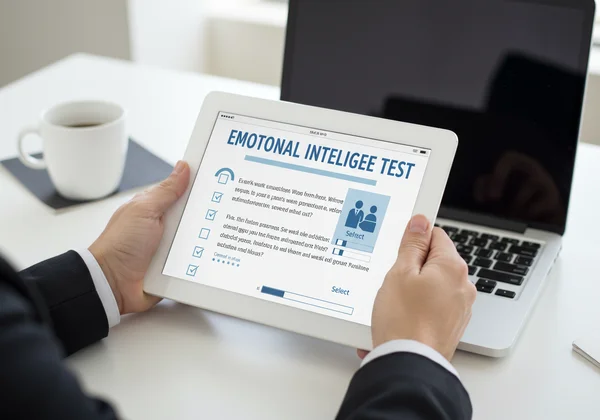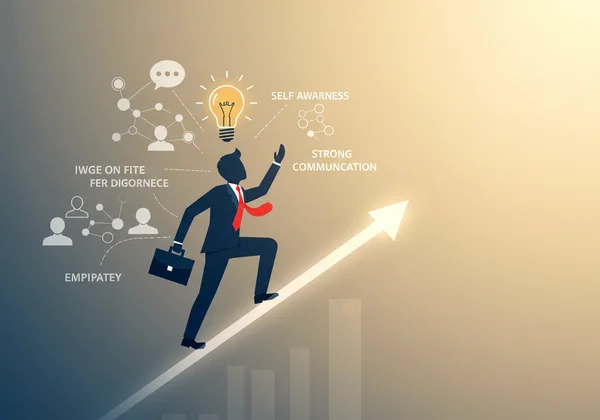Low Emotional Intelligence at Work: 7 Signs & EI Test Help
November 13, 2025 | By Evelyn Reed
Do you ever feel like you’re speaking a different language from your colleagues? Perhaps you find team dynamics draining or constructive feedback feels more like a personal attack. These workplace challenges often stem from a single, overlooked source: low emotional intelligence. But how do you know if you have high EQ? This article will uncover seven common signs of low emotional intelligence in the workplace and reveal how a simple assessment can be the first step to transforming your professional relationships and career trajectory. Ready to gain clarity? You can take our free EI test and discover your emotional strengths today.
Understanding Low Emotional Intelligence and Its Workplace Impact
Emotional Intelligence (EI), or Emotional Quotient (EQ), is the ability to perceive, use, understand, manage, and handle emotions. In the emotional intelligence workplace, this skill set is as crucial as technical expertise. Individuals with high EI can navigate social complexities, lead with empathy, and make thoughtful decisions. Conversely, low EI can create friction, hinder collaboration, and silently sabotage careers. Understanding its impact is the first step toward meaningful improvement.
What Exactly is Low EQ in a Professional Context?
In a professional context, low EQ isn't about being overly emotional; it's about a disconnect in how emotions are managed and interpreted. It manifests as a difficulty in recognizing your own emotional state and its effect on your actions. This can lead to misreading social cues from colleagues, reacting impulsively under pressure, and struggling to build the rapport necessary for effective teamwork. It’s the invisible barrier that can prevent a talented professional from becoming a truly great leader or team player.
The Hidden Costs of Unaddressed Low EI at Work
The hidden costs of low emotional intelligence are significant. For individuals, it can lead to stalled career growth, damaged professional relationships, and chronic stress. For a team, it can result in poor morale, decreased productivity, and a toxic work environment where feedback is feared and conflicts fester. Managers with low EI struggle to motivate their teams, while employees may disengage. Over time, these unaddressed issues erode trust and efficiency, impacting the entire organization's bottom line.

Spotting the 7 Key Signs of Low EI in the Workplace
Recognizing the behaviors associated with low EI is critical for personal and organizational growth. These signs of low eq are not character flaws but rather undeveloped skills that can be improved with awareness and practice. Here are seven key indicators to watch for in yourself and others.
Difficulty Accepting Constructive Feedback
One of the most common signs is a defensive or emotional reaction to constructive criticism. Those with lower EI may perceive helpful feedback as a personal attack rather than an opportunity for growth. They might argue, make excuses, or shut down completely because they struggle to separate their personal feelings from their professional performance. This reaction prevents them from learning valuable lessons that could accelerate their career.
Frequent Blaming or Lack of Personal Accountability
Do you know someone who consistently points the finger when things go wrong? A lack of personal accountability is a hallmark of low EI. Instead of reflecting on their role in a mistake or failure, they look for external factors or other people to blame. This behavior erodes trust and makes it impossible to solve problems effectively, as the root cause is never addressed. True emotional maturity involves owning your actions, both good and bad.

Poor Conflict Resolution Skills and Avoidance
Conflict is a natural part of any workplace, but how it's handled is a strong indicator of emotional intelligence. Those with low EI often resort to two extremes: aggressive confrontation or complete avoidance. They may either escalate disagreements with emotional outbursts or ignore problems until they become unmanageable. Effective conflict resolution requires empathy, self-regulation, and the ability to find a middle ground—all core components of high EI.
Inability to Manage Stress and Pressure Effectively
The modern workplace is often a high-pressure environment. The ability to manage stress is a critical EI skill. People who struggle with EI are more likely to feel overwhelmed, become irritable, or make rash decisions when under pressure. They lack the self-regulation techniques to stay calm and focused, which can negatively impact their well-being and the quality of their work. A proactive first step to understanding these patterns is to get your EI assessment.
Struggling with Empathy and Understanding Others' Perspectives
Empathy is the cornerstone of effective collaboration and leadership. It’s the ability to put yourself in someone else's shoes. A person with low EI struggles with understanding others and their viewpoints, especially if they differ from their own. They may appear insensitive, dismissive, or self-centered, not out of malice, but because they genuinely have difficulty reading emotional cues and appreciating different perspectives.
Resistance to Change and New Ideas
Adaptability is key to success in a constantly evolving professional landscape. Low EI often manifests as a rigid resistance to change. Because change can trigger feelings of uncertainty and fear, individuals without strong emotional management skills may cling to familiar routines and dismiss new ideas without consideration. This can stifle innovation and create bottlenecks within a team.
Inconsistent or Explosive Emotional Reactions
A final, clear sign is a pattern of disproportionate emotional responses. This could be a sudden angry outburst over a minor issue or visible frustration in a team meeting. These explosive or inconsistent reactions signal a struggle with self-regulation, a core pillar of EI. This emotional volatility makes colleagues feel like they are "walking on eggshells," damaging psychological safety and open communication.
How an EI Test Can Help You Cultivate Higher EQ
Identifying these signs is the first step, but what comes next? This is where objective EI test help becomes invaluable. A well-designed emotional intelligence test moves you from speculation to awareness, providing a clear roadmap for improvement. It’s a tool for empowerment, not judgment.
Gaining Objective Self-Awareness with an EI Assessment
You can't fix what you can't see. An EI assessment provides an objective, data-driven snapshot of your emotional strengths and weaknesses. Instead of guessing why you react a certain way under pressure or struggle with feedback, a test offers concrete insights into your patterns. This self-awareness is the foundation upon which all emotional intelligence growth is built. An online test provides a convenient and private way to start your journey toward greater understanding.

Personalized Insights for Targeted Growth and Development
A simple score is not enough. The true value of a modern EI test lies in personalized insights. Our online emotional intelligence test uses AI to generate a detailed report based on your unique answers, going far beyond a generic summary. It highlights specific areas for development and provides actionable strategies you can implement immediately to improve your self-regulation, social awareness, and relationship management skills.
Your First Step Towards a Higher EQ at Work
Transforming your professional presence begins with a single, decisive action. Taking an EI test online on our platform is your first practical step towards building a higher EQ at work. Our assessment is based on established scientific frameworks and designed to be accessible for everyone, from students to senior leaders. Don't let unmanaged emotions hold your career back any longer. Discover your EI score and unlock your full potential.
Elevate Your Workplace Presence: Take Your EI Test Today
Recognizing the signs of low emotional intelligence—from difficulty with feedback to poor stress management—is crucial for anyone seeking professional growth. These behaviors are not permanent traits but skills waiting to be developed. By understanding your current emotional landscape, you can begin building the empathy, self-regulation, and social skills that define great leaders and invaluable team members.
Your journey to a higher EQ and a more fulfilling career starts with awareness. Ready to take that first step? Take our free, confidential emotional intelligence test today.

Your Questions About Emotional Intelligence at Work Answered
What is the EI test, and how does it work?
An EI test is a standardized assessment designed to measure various aspects of your emotional intelligence, including self-awareness, self-regulation, empathy, and social skills. Our online EI test presents you with a series of situational questions. Your answers are then analyzed to generate a comprehensive score and an optional, in-depth AI-powered report that offers personalized insights for your development.
What is a good EI score, especially for professionals?
While scores can vary between different tests, a "good" EI score generally indicates a strong balance across all core emotional competencies. More important than a single number is understanding your specific profile of strengths and areas for improvement. A high score in empathy but a low one in stress management, for example, gives you a clear target for growth. The best way to understand your score is to take an EI test and review the detailed breakdown.
How can I start to improve my emotional intelligence at work?
Improvement starts with self-awareness. After taking an assessment to identify your development areas, you can begin practicing specific techniques. For example, if you struggle with feedback, practice pausing and asking clarifying questions before reacting. If stress is an issue, incorporate mindfulness or breathing exercises into your day. The key is consistent, intentional practice.
Are people with higher EQ more successful in their careers?
Numerous studies suggest a strong correlation between high EQ and career success. Professionals with higher emotional intelligence are better communicators, more effective leaders, and more resilient in the face of challenges. While technical skills get you in the door, emotional intelligence is often what enables you to climb the ladder, lead teams effectively, and build a lasting, positive career legacy.